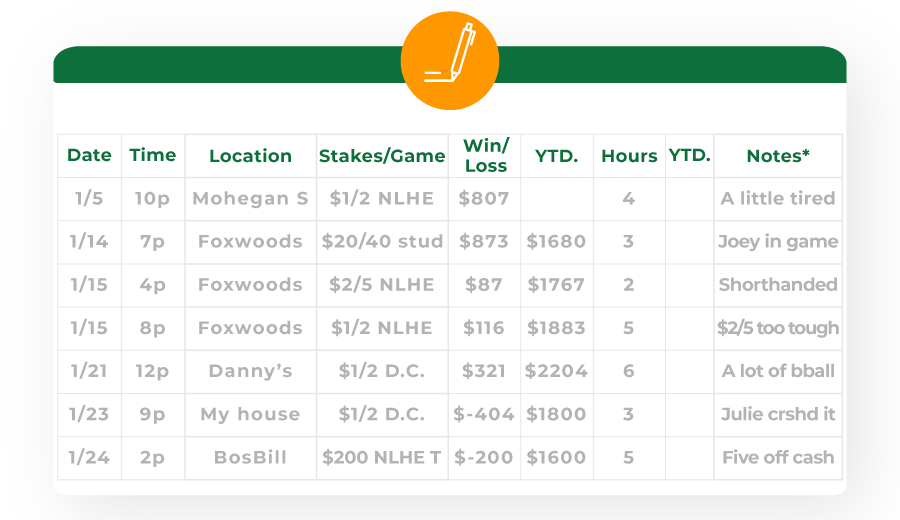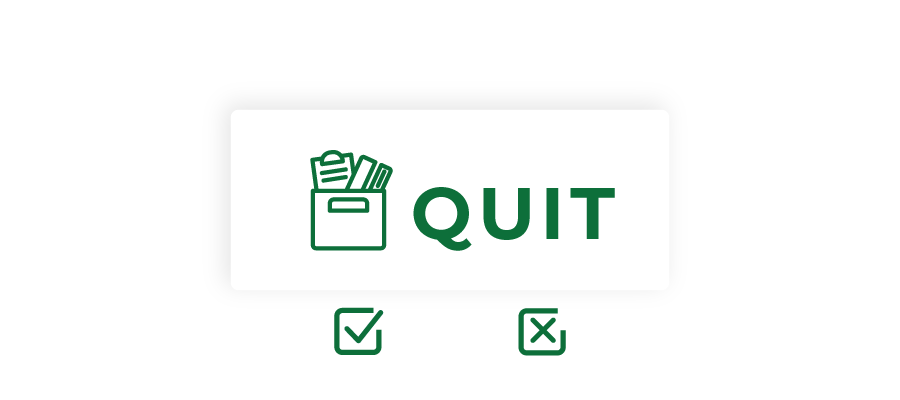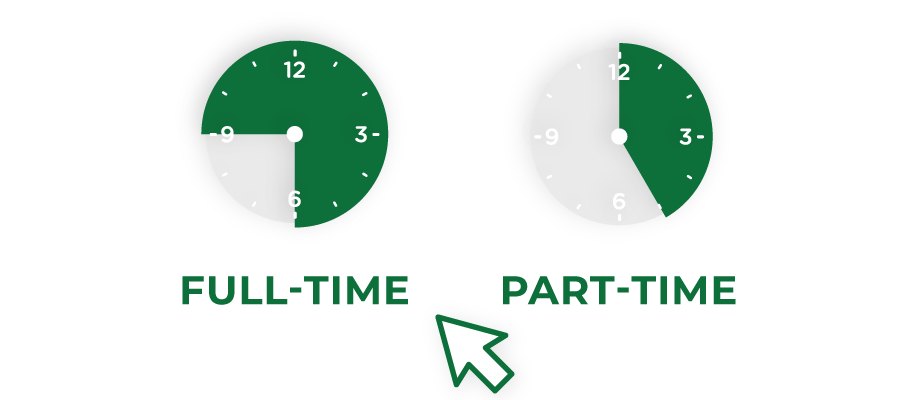Poker is a hobby in which a serious and talented player can turn a nice hobby into a profession. We’ve all heard tales about people who have done just that. Why not you?
But is this realistic for you? What does it take? Can you actually turn this fantasy into a reality?
In this guide, expert player Ashley Adams will help you answer those questions, as well as provide you with a step-by-step plan on how to play poker for a living.
Here’s what you’ll learn:
A recreational poker player, Arty, sees that he’s got $7,500 in his drawer at home, after a few months of playing $1/2 no limit at a nearby poker room.
He started with $1,500. Though he doesn’t have a detailed record, he figures he’s played about 15 hours a week in the last 20 weeks.
That’s 300 hours.
He figures that if he’s up $6,000 for 300 hours, that’s $20 an hour playing $1/2.
Based on this, he estimates that if he plays 50 hours a week, making $20 an hour, that he’ll earn $1,000 a week, and $52,000 a year - which is just a little less than he makes at his full-time job.
He also figures that if he can make that at $1/2, that he could probably make $100,000 playing $2/5.
He’s thinking about quitting his day job, so he can start his career as a professional poker player.
If this sounds appealing, please think again!
This is completely wrongheaded. It’s a recipe for disaster and definetly not how you can play poker for a living.
Let’s start by exploring 7 reasons why this is so:
1. Inadequate Sample Size

Aspiring pros need to understand how much variance there is in poker, and how unindicative short-term results can be in determining whether someone is in fact beating the game.
The rule of thumb is that someone needs either 500 hours in a brick-and-mortar casino or 100,000 hands on line before they can really have confidence that their positive results mean they’re beating the game.
Arty, in our example above, has only played 300 hours.
His results are good. But he just hasn’t played long enough to really assess if and by how much he’s a winning player.
2. Shoddy Record Keeping

Arty doesn’t really know how much he’s winning an hour. He hasn’t kept good records.
Maybe he’s played longer than he’s estimated; making his hourly win smaller. Maybe he threw money in the draw that wasn’t just from poker play.
If you want to make your living from poker you need to treat poker as a business. That starts with accurate, honest, and consistent accounting.
3. The Full-time Play is not Likely to Produce the Same Results as his Part-time Play

Arty now plays poker on nights, weekends, and holidays when he’s not working his day job. Accordingly, he’s playing only at those times when the game is likely to be most profitable.
If he expanded from 15 hours a week to 50 hours a week, he’d be more likely to have to play during the day and during the week, when he’ll be up against short-stacked regulars and grinders like himself (as opposed to drinking tourists and other fish who tend to populate the game at night, on holidays and weekends).
His results would almost surely be worse per hour over a 50 hour week.
4. He’s Unlikely to Keep Up his Best Game Playing 50 Hours a Week

Players tend to play their best game only during shorter sessions. As a session grinds on, players tend to be less focused, less energetic, and more robotic.
Their win rates tend to fall as they lose concentration and motivation to play their best game at all times.
Similarly, if you’re playing 50 hours a week, every week, you’re more likely to be playing sometimes when you’re feeling sick, or distracted, or otherwise not at your best.
You’d have to adjust your expected hourly rate downward to reflect this.
5. Results at Bigger Games are Overly Optimistic

Arty assumes that he’ll double his hourly rate when he moves up in stakes to $2/5. But bigger games tend to attract and retain better players, making them tougher.
If he beats $2/5 at all, it will almost surely be for less than double the rate of his winnings at $1/2.
6. He Doesn’t Yet Have the Bankroll for Full-time $2/5 Poker

$7,500 is sufficient for playing $1/2, but it’s not nearly enough for the bigger game he imagines stepping into.
For $2/5 he’s going to want at least at least $10,000 for his bankroll.
7. Arty Hasn’t Thought at All About His Living Expenses

Before you can start playing poker full time, and quit your day job, you’ll need to have at least six months of living expenses saved, so you don’t raid your poker bankroll to pay for your living expenses.
In addition to the $10,000 he needs as a poker bankroll, if his living expenses are a modest $50,000 a year, he’d want $25,000 saved for living expenses.
$7,500 is less than a quarter of what he’s going to need to safely quit his day job.
Ok, so Arty did it wrong. What should you do differently?
Here are the steps you should follow if you want to seriously consider a professional career
A Prerequisite: Keeping Good Records
No carpenter would consider working without a ruler or a level. So too must you, the aspiring poker professional, have a way to measure your progress.
You must keep an exact and careful record of your poker performance. This means keeping track of every session, with enough detail about the session for you to see your progress over time.
Here’s what I suggest you record. (There are many apps for this that you could use. But if all else fails, just keep the information on a spread sheet or even in an old-fashioned notebook, as I always have)
At the end of every session, before you leave for home or stand up from your computer, record the date and time of the session, where you played, the type and stake of the game or tournament, how much you won or lost for the session, the year-to-date win loss after the session, how long you played, and your year-to-date hours of play.
Then make some simple notes about the game. Jot down something about the players, about your own play and state of mind, and then, if you can, some problem hands to consider away from the table.
Here's how this poker playing log might look. Yours should be longer.

Keep track of all of your sessions, even when you think things were atypical or otherwise not reflective of your play.
You’ll keep track of the stack-crushing bad beat, the one where you lost $1,000 when you got cooled, and certainly any and all sessions when you went on tilt.
It’s all got to go in the log because it’s all part of your play.
Remember
These records will show you whether and by how much you are beating a game. They, alone, won’t be able to determine whether you’re ready to move up to a bigger game, but they are essential if you are to consider such a move.
Master the Lower Stakes Games

Whether or not you decide to play poker for a living, you’ll surely want to master the game so it becomes a profitable activity for you.
If you are just starting out, this means starting with the lowest stakes games and then moving on up.
Keep in mind
Online games play very differently than those in a brick-and-mortar casino. Microstakes games of $.01/.02, $.02/.05, and $.05/.10, only available on line, play similarly to the worst $1/2 games in a brick-and-mortar casino. $1/2 games on line play more like $5/10 games.)
Beating even the lowest stakes games takes some skill.
To gain that skill, you’ll want to learn and then apply correct strategy. Toward that end, I recommend reading my other guides on Chipy.
These guides are necessary but not sufficient, as you will need a lot of experience and training before you have mastered the game. Even so, these are good places for beginning the long road toward poker mastery.
If you started at the microstakes, you want to move up quickly, as they are not really big enough for you to earn much money per hour, even if you are multi-tabling. Realize that for most people who multi-table, their win rate per game will diminish as they increase the total number of games they’re playing at once.
As you move up, you will need to acquire new and different skills.
While just playing tightly might work for the lowest stakes games, where the level of opponents tends to be poor and extremely loose, as you work your way up, you’ll need to consider:
- the type of player you’re facing;
- how they are viewing your play;
- how you can balance your play to avoid them getting a solid read on you;
- how you can profitably apply game theory;
- how to add a strong measure of deception into your play.
Become a Full Consumer of Poker Information

The guides referenced above are your starting point.
You will surely want to continue your poker education with more articles, poker books, blogs, podcasts, and training videos. You may want to hire a poker coach.
Perhaps most important of all, you should become part of a poker discussion group by creating or inserting yourself into a poker community.
Join a Poker Community

In my 13 years as host of the poker radio program, House of Cards, I interviewed over 100 people who made their living playing poker.
I asked each of them one identical question: “What is the one thing you did that most contributed to development of your professional-level poker skills.” More than 95% of them said that it was talking with other similarly motivated players. Not books, not magazines, not videos, not websites, not podcasts, not even coaching.
It was talking about poker with other thoughtful players that had the most positive affect on their game!
You may already be part of a group of learning players. If so, make sure to have regular discussion of poker hands with them. If you can’t build your own group, I suggest that, at the very least, you join an on-line discussion group. Start analyzing hands and talking about different situations you have faced.
Listen to the opinion of others. Engage in meaningful conversation. That’s the best way to accelerate your poker learning to a professional level.
This should not be something you do when it is convenient. Schedule at least a few hours each week for this rigorous poker discussion.
Bankroll Requirements

I suggest that you first beat the smaller games before you move up to the bigger ones.
The smallest games are the microstakes, found only on line. These are the games with blinds of $.01/.02 ($2 buy-in) up to $.10/.25 ($25 buy-in).
The smallest stakes available in a brick-and-mortar casino tend to be $1/2 or $1/3. (Bear in mind that games play relatively tougher on line. $.10/.25 on line plays like a fairly tough $1/2 game in a brick-and-mortar casino).
There is no requirement that you move up gradually, starting with the lowest stakes games. Have the minimum buy-in of $1000 for the $10/25 game, and think you can beat it? You are free to jump right in and see how you do.
But there’s a reason I suggest caution. It’s your risk of ruin.
Risk of Ruin

With very few exceptions, no one has an unlimited poker playing bankroll. Play over your head for long enough, and even the best heeled among us can run out of money. That’s why there are rules of thumb about how much money you need to really compete at different levels of the game.
If you are playing over your head, you run the risk of losing all of the playing capital that you have - and that puts you out of action.
if you are a winning player, with an overall positive expectation for a game, you will still suffer ups and downs in your results, as you ride the wave of variance. Losing streaks can last a long time - weeks and even months long.
Even if your general trend is positive, you’ll need to have enough capital to survive through the inevitable losing streaks. (If you are a losing player, by the way, no amount of bankroll management, can keep you from losing all of the money you gamble, if you play long enough).
Table Minimums and Maximums Notwithstanding. How Much Do You Need?

The general rule of thumb is that, depending on your playing style and tolerance for risk, you should have a playing bankroll of 20 to 50 buy ins for a no limit game (a buy-in is generally considered 100 BB), or 600 to 1,000 big blinds in a limit game.
Specifically, if you wanted to try your hand at beating the $2/5 ($500 buy-in) game, that would require a bankroll of $10,000 - $25,000. Another way of expressing this is that you want to be playing on no more than 5% of your total bankroll at one time.
For example
If you bought in for $1,000 in a $2/5 game, and had a bankroll of $20,000, you’d be playing with 5% of your bankroll. You can read a more thorough explanation of bankroll considerations at the bankroll guide below.
Keep in mind, that if you are a losing player, no bankroll is sufficient to prevent you from losing it eventually.
I’d like to stress that as your poker bankroll gets bigger, it gets progressively more difficult to replace. To be prudent, you might want to couple this increase in difficulty of replacement, with a more conservative approach to your bankroll requirements.
Toward that end, you might want to follow a more geometric progression in bankroll requirements, as you move up in your poker playing career.
Instead of following this progression on minimum poker playing bankroll as you move up in stakes:
| Stakes | Minimum Requisite Playing Bankroll |
| $.02/.05 | $100-$250 |
| $.25/.50 | $1000-$2500 |
| $2/5 | $10,000-$25,000 |
| $25/50 | $100,000-$250,000 |
It may be more prudent for the aspiring professional poker player to follow this progression:
| Stakes | Minimum Requisite Playing Bankroll |
| $.02/.05 | $100-$250 |
| $.25/.50 | $2000-$5000 |
| $2/5 | $40,000-$100,000 |
| $25/50 | $1,000,000-$2,500,000 |
Taking A Shot Option

The above notwithstanding, you might take a different approach as you move up in stakes in your poker playing career.
You might decide, for any of a number of reasons, that you want to take a shot at a bigger game even before you are ready to make the transition full time.
You can allow yourself this gamble, provided you build in a few safeguards.
Let’s say, for example, that you’ve been grinding it out at $1/2 for half a year. You’ve determined that you are a winning player in the game, having played 1,000 hours and averaged $13 an hour doing so. Your bankroll is now $18,000. That’s $13,000 more than you started six months ago.
You don’t have nearly the $40,000 you’d want as a minimum to start playing $2/5 full time, but you’re still interested in trying your hand and taking a shot at the game.
You see the $2/5 game is filled with a few of the splewy donators you have played against before at $1/2 (and beaten soundly). So you decide to make your move and take a shot when a seat opens up.
Go ahead and do so.
The buy-in spread is $200 to $1,000. Don’t put the full $1,000 on the table. Just buy in for $500. Be prepared to reload for another $500 if necessary. Give yourself a full four hours and see how you do.
If you win, great! Stay in the game.
Keep playing until the end of your four hours. Maybe you’ll find the game plays more easily than you expected - in which case, when a similar line up presents itself, you can move over again.
Meanwhile, you’ve gotten a taste of the game; you have had experience with it; and you’ll be less intimidated the next time you play. These are all good things.
But if you’re not successful - if you drop all or a good portion of that $1,000 you were willing to spend in the game - hat’s not a catastrophe. You’ll just move back down to $1/2, grind it out, and eventually, if you apply yourself as you did before, you’ll earn back what you lost.
You can then take another shot at $2/5 if you’d like.
What you want to resist is the temptation to stay at $2/5 as you try to earn back what you lost in the game. That’s a risk.
Many can’t resist, as they are driven by ego not to put their tail between their legs and make a tactical retreat.
But retreat you must, though it may bruise your ego, since you are not adequately staked to play at the bigger game. If you stay you could burn through all your poker money, making it more difficult for you to get the money necessary to even play your regular game.
Pluses and Minuses of Taking a Shot

There are some advantages to taking a shot, as I have described, as opposed to committing to make a move to a bigger game.
You can move up sooner, accelerating your progress towards the goal of playing at stakes necessary to support a full-time professional income.
If you get lucky, or find that you actually do possess the skills necessary to beat this game, even as you are playing it for the first time, you can jump into the new stakes more quickly this way than waiting to build a complete bankroll for it. You can find out more about the skill vs luck aspect in poker from my dedicated guide.
You’ll also be helping yourself psychologically. You’ll be experiencing the bigger game, and becoming mentally ready for it. It will appear less of a scary unknown.
When you move back down to the smaller game, it won’t seem as big a step to move up.
This shot will help your confidence at the table.
But there are risks as well. By sitting in a bigger game, you run the risk of running through your bankroll more quickly than you are prepared for.
Cautions notwithstanding, some players who lose in a bigger game, cannot resist the siren’s call to continue to play at it until they win back what they’ve lost, even though they planned to move back down if they lost.
When they do this, they often dig themselves deeper into the red, sometimes destroying their entire bankroll.
Similarly, if they do go back down in stakes, they find they become bored and impatient at it - and their game suffers terribly as a result.
This can result in ruin of another sort, as they fatalistically continue their losing ways at the lower stakes game.
Important
The ultimate decider, of course is you. Ironically perhaps, I suggest that the more impulsive and impatient among you take the slower and more methodical route of waiting to move up until you have assembled the full bankroll necessary for the game.
The more conservative among you can allow yourself the freedom to take a shot now and again, with the parameters I have also recommended.
Assessing Others

I’ve noticed over my 3 decades of professional play, that many aspiring professionals try to compare themselves to other pros, to see how they measure up.
Side note
There’s no way to know whether anyone else is really a winner or a loser, a professional or a pretender. You just have no idea.
So don’t spread gossip and talk about it. See someone who acts like they know what they’re doing? It doesn’t make them a winner. They may lose more than they win. See someone cash out for a few thousand in a $1/2 game? You have no idea how much they were into the game.
Same thing with tournament scores.
Sure, on Hendon Mob it says that this player has won $6.2 million. You have no idea if they’re an overall winner at tournaments.
Hendon doesn’t list the tournaments with no cash.
Maybe they entered a whole bunch of high roller tournaments for $100,000 a pop and finished out of the money in all of them. You have no idea. You have no idea if they lost all their listed tournament winnings in losing cash games.
No idea. So don’t act as if you know. Because you don’t. Only they know. And it’s only their business (and maybe that of the IRS).
It's tempting to compare yourself to others in the poker. This is especially true as you trying to prove that you have the chops to “go pro”.
But down this road madness lies.
Worry about yourself, focus on your game, keep track of your results, and let others concern themselves with whether or not they are truly professional poker players.

Before you can quit your day job, you need to decide how much you need to live for a year. Think in terms of net income, after taxes.
Sure, you can try to cheat the government out of paying taxes. You might think it will be easy because as a poker player you are dealing in cash, without the government deducting anything from your paycheck.
But think again.
If you are audited, you will be asked how you paid for everything in your life. You can try lying about it. But if you are found out, you will owe not just the taxes, but interest on the unpaid amount and penalties besides.
Even if you are not audited, try to get a mortgage or even a car loan with no reported income to the IRS. It’s very hard.
So get ready to buy everything in cash - which will trigger reporting to the IRS, and then a likely audit.
Quitting your job and replacing your current income is not just a matter of making the same money in profit at the poker table as you made in salary at your job.
You’re probably also going to want to replace the benefits that you currently get from your day job.
Do you have a pension through work? You’re going to want to fund it from your poker income.
Same thing with health insurance, sick days, vacation, holidays, social security, unemployment insurance. a decent life, then you are just robbing yourself down the road.
Pro tip
As a practical matter, a good benefit package, that you are likely to get with a full-time professional job, costs your employer an additional 30-40% of your salary (This is true in the US. Other countries will be different).
Accordingly, you want to add at least 30% to your current salary if you want to earn from poker the equivalent of your salary at work.
As a practical matter, if you figure you need a $100,000 salary to be a full-time, self-supporting professional, with health insurance, some form of retirement, paying your taxes, paid vacation, sick days and the like, you’ll want at least $130,000 a year.
$130,000 is roughly $65 an hour, working 40 hour weeks, for 50 weeks a year.
If you want more vacation or to work fewer hours a week, you’ll have to adjust your hourly earnings upwards.
As a practical matter, the most successful professionals calculate that they earn, on average, over the long haul, between 3-6 BB per 100 hands, depending on the stakes and the toughness of the game.
You can see the difficulty of making a good middle-class professional living.
To make $65 an hour, you’d need a crushing win rate at $2/5, and probably a strong $5/10 game. That’s really hard (though not impossible).
Side note
Another option is to lower your expectations for your required income. You might make do with only $25,000, and go into LIMBO (Living In Mommy’s Basement Option). You could do that making $12-13 an hour, something a solid $1/2 player can do.
You’d have the advantage of being able to set your hours, play when you wanted, sleep late if you felt like it.
But you’d also have to play even if you didn’t feel like it, if you found you were behind in your earnings or wanted extra money.
Don’t fool yourself.
The game of poker is different when you must win in order to pay bills. The pressure gets to a lot of people, who find that they really liked poker as a hobby, but can’t stand it as a 40 or 50 hour a week job.
You might want to look into meditation, relaxation and other techniques for dealing with stress.
One of the other complaints people have of the game, when they play it full time, is that they have to associate with some miserable people who also play poker full time.
The game attracts degenerate gamblers, alcoholics, bullies, whiners, and some other unsavory sorts. Do you want to spend your working hours dealing with these people?
The job is also extremely sedentary.
You’re inside, peering at cards, seated, for hours. Is this something that appeals to you?
In short, once you master the skills of poker, and have the option of doing it full-time for a living, you may come to the conclusion that full-time professional poker isn’t for you.
Full-time or Part-time: How to Schedule Your Poker Play?

The life of a typical full-time professional may be less glamorous and less remunerative than you think.
I’ve known tens of thousands of people who have played poker.
Some of us make money at it; most do not. I’d say the ratio of winners to losers is roughly one to ten. And those who make enough to live on probably less than 1 in 100.
Among the winners, I know well some who have earned a full-time living from it.
But they are not the superstars, the famous, or the well-heeled that I have interviewed for my poker radio show. Rather, the full-time professionals I have known lived a very modest life.
It was spartan, with little to show for their hours of play.
They earned between $10,000 and $40,000 or so a year. They didn’t purchase a home with their poker income; rarely went on any vacations; and, aside from spending their time in a somewhat luxurious casino most days, lived a pretty plebian life.
I know far more people who make money at poker, but who also have regular day jobs that pay the bills. The day jobs typically provide a good level of satisfaction and financial support, even as poker provides some extra income.
These are either profitable poker hobbyists or semi-professional poker players, depending on how you define those terms.
I would say they are the happiest of the profitable players I know. They are not stressed when they lose; but are extremely happy when they win.
If you are determined to make it as a professional poker player, let me add this recommendation.
I suggest that you focus on improving your skills, learning, playing, and building your bankroll - just as you would do if you were planning on turning pro. Set an earnings goal per hour.
Play poker while holding down a day job.
My recommendation
If you find you can make your win desired rate for six months, while building a poker bankroll that exceeds the requirements outlined above, then you can decide to play for a living full-time. But don’t quit your day job. Take a long vacation or a leave of absence for four to six weeks.
During that time play poker full-time and see how you like it. If you do this and the work fulfills you, then and only then can you actually quit your job and “turn pro”.
Conclusion
As you can see, playing poker for a living can be difficult, even if you do all the work to become a very successful player.
When all is said and done, you might not want this type of work.
But even if you decline to play poker full-time, by taking the game seriously, playing thoughtfully, handling your money carefully, and always continuing to learn, you will be getting as much out of the game as you’d like.

Bonuses
Casinos
Games
Academy
News
Shop
NEW Q&A
Sweepstakes





































